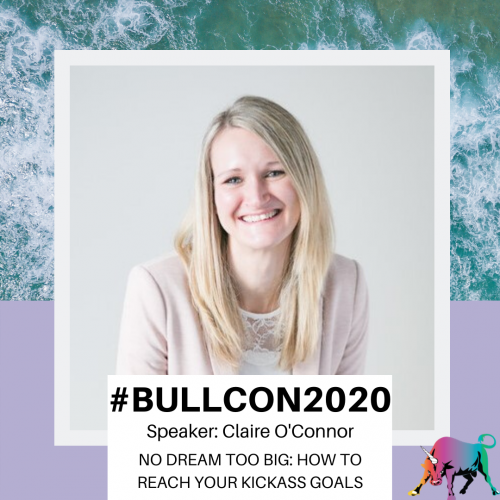This article is more than ten years old. It originally ran on a now-defunct website called The Gloss, where Bullish got its start. This post was created entirely by humans, as AI didn’t exist back then (but also: why would you want to read something no one could be bothered to write?) For more recent posts, try here.
In last week’s Bullish: This Year’s Most Aggressive Lady-Advice (and Bullicorns!), I shared that my project for last year was to start many companies that work together, sharing resources. In Bullish: Screw New Year’s Resolutions – Try Designing Your Career, I talked about how this shit seriously does not happen on its own.
So here we are! It’s January 6th, and so far I have:
– Been collecting a list of business ideas for years (the list has about 40 ideas on it).
– Categorized the list by topic area (nearly half the ideas are in education, where I’ve spent most of my career).
– Prioritized the list, starting with things I’m pretty sure I actually know how to do (or at least begin).
– Named many of these companies and purchased domain names (my best domain name, for a Christmas tree delivery service: Treelivery.com!)
– Taken some time off from paid work to do a hell of a lot of research (again, see the designing your career column).
– Made my apartment into a better workspace.
– Drastically cut my personal expenses.
– Drastically cut my time-wasters (my celebrity magazines are going directly in the recycling – that was my last major time-vice! I haven’t seen a movie since outside of an airplane since Black Swan was in theaters).
– Signed up for some educational seminars, especially in accounting.

Things I don’t plan to do:
– Get an MBA (people often ask me about this, as I am a GMAT instructor and have a very nice GMAT score; I also hate groupwork).
– Get investors (only one of my businesses is likely to require outside funding, so I’m saving that idea until later).
– Learn more about financial statements so I can put made-up numbers on one! (The main purpose of financial projections is to satisfy investors, which I won’t be needing.)
Ooh, everything is so scary because we’re girls!
The Internet is rife with articles like this, about the deep, probing questions you should ask yourself before taking the entrepreneurial plunge. But really: what are the other options? (See Bullish: How to Motivate Yourself to Be Motivated for more on lighting your fire with fear, disgust, and revenge.)
When I was in college, by the time I was 20 or 21, I felt pretty ridiculous still being a student. I dissembled at every opportunity, trying to get people to think I was a “real” adult. I passed off the mailing address of my co-ed fraternity as a business address. I’ve had business cards since middle school. I think I caught on early that, in capitalism, you’re basically a pimp or a ho. If you’re the pimp, you can choose to operate differently and ethically; you can change the system. Otherwise – not so much. (For a related metaphor, see Bullish: Basing Your Career On A Resume Is Like Competing In A Brothel Lineup.)
Personal finance writer Ramit Sethi recently wrote “I found that career advice for women is almost unreadable. With phrases like ‘You go, girl’ and approximately 68,000 references to shoes and ‘climbing the ladder,’ I found myself wondering: Are women really this dumb? The answer is no. But the advice is.”
I talk all the time about diversifying your income streams. Being dependent on a single boss makes you vulnerable (see Bullish: How to Run Your Career Like a Business). That’s scary.

Making My Life Make Entrepreneurial Sense
My gentleman friend (I refuse to call a forty-year-old a “boyfriend,” no matter how sprightly he looks) has made some wise and conservative investments regarding his retirement. This makes me a bit sleepy.
“But I’m going to start a million more companies before I retire, and the best way to invest my money is in my own businesses,” I say. We’re both right, in the sense that we’re playing probabilities based on limited information. In any case, he asked me what my “carrying costs” were.
“Oh,” I said. “I don’t really have any expenses other than rent. Electric, I pay with the rent. I mean, I have an iPhone. That’s it. I don’t have any debts. I’m paying for my masters degree in cash.”
“Come on,” he said. “I’ve seen your closet. And you went to India.”

So, I started adding. I had forgotten about Metrocards and the dentist and the deductible on my medical insurance and taking my elderly cat to the vet. I buy enough FreshDirect to be a member of the “Chef’s Table” program, which is hard to do as a single person (you have to drink a lot of Chimay). I own twenty blazers, because it’s hard to look like a serious person if all your clothes drape: you might as well stand pigeon-toed and cock your head to the side and say your own name as though it’s a question. (See Bullish: Speak Up Like a Competent Badass in Class and at Work.)
In Bullish: Social Class in the Office, I wrote about the disconnect of blue-collar kids who end up at Ivy League schools, and working in a white-collar world. I was pretty sure I was the only student at Dartmouth who had never been to Europe (being born on a Navy base doesn’t count).
So, suffice it to say, when I was finally able, I traveled, and bought the trappings of what I view as a dignified life. I spent one year of my early thirties living close to a six-figure lifestyle (while still putting money in the bank, of course).
And now I’m done, and back to, well … the grindstone. The first time around as an entrepreneur, I lived on less than $15,000 a year. I know what Wal-Mart soup tastes like (surprisingly, just like all other canned soup). Despite what your hairdresser tells you, the best way to grow long hair is just to not cut it. It’s free!
In Bullish: How Talking About Money Can Make You More of It, I advocated (polite) disclosure among friends. Sharing real numbers helps us all. So, separate from my emergency fund, I have $50,000. The goal is to turn it into several million dollars.
I can do this while covering my own, toned-down carrying costs, since fortunately I have a high-paying part-time job (which, in 2007, I spent more than six months of unpaid, nearly full-time grinding in order to qualify for). And obviously, I do some freelance writing.

I also should start tracking hours spent on my entrepreneurial projects. As pointed out in the famed business tome The E-Myth, many “entrepreneurs” just end up giving themselves new jobs, becoming their own horrible bosses. I don’t want to end up tying myself to some new, tedious hourly pursuit. Just as I don’t want to fritter away my cash on businesses that sound cool but don’t bring in revenue, I don’t want to fritter away my time, either. I’m not in this for an enhanced personal identity; I need to make sure my time produces a return, or else delegate or take the task off the table entirely.
Finally, a lot of my business ideas depend on my expertise as a test prep instructor, fitness-type person, and speaker. I’m also a little more than halfway through a masters in education. So, I also need to boost my own learning and skills in a few key areas, but I need to 1) make a profit on my education, and 2) learn to learn even better and faster. The latter topic will be addressed in future columns.
Finally, see Steve Pavilina’s 10 Ways to Relaxify Your Workspace. This is the little stuff a person can do when her brain is dead to intellectual tasks. I now have a standing desk. I think I lost five pounds in the first two days, and you’d be amazed at how much you reset your brain just by staring at a different wall of your house.

Knowledge is Free! The Government Wants to Help!
If you’re an entrepreneur, who’s going to be impressed by an MBA? You’re not applying for a job. As Penelope Trunk writes of wannabe entrepreneurs who go to b-school, “If they really wanted to work at a startup, why didn’t they launch one? Clearly, money was not the barrier, because they had $100,000 to burn. So it’s something else. I think they don’t start companies because they do not have any ideas. Or, in the case where a person actually does have ideas, he doesn’t believe in himself enough to give his own ideas a shot.”
If you actually want to learn something, fortunately, we live in a brave new world in which knowledge is basically free. Educators like me just exist to help curate knowledge, deliver it in a variety of pleasing flavors, and interpret it as the situation demands.
There’s free knowledge, if what you actually want is the knowledge itself rather than the connections or big-name degree. MIT has famously put the materials for its classes online at Open Courseware, including courses on Early Stage Capital, Designing and Leading the Entrepreneurial Organization, Entrepreneurial Finance, Entrepreneurial Marketing, and Introduction to Financial and Managerial Accounting.

Public libraries and city governments also tend to offer a lot of standard-issue business information, sometimes in the form of webinars, in-person workshops, or even individual counseling appointments.
Each state also has an SBDC, or Small Business Development Center. New York’s offers counseling and a variety of free seminars in all five boroughs. (And here are the top four business resources in NYC, according to NAWBO).
Basically, state and local governments really want to promote entrepreneurship, and in most cases just kind of dick around in the mud about it, because the point of entrepreneurship is pretty much that you do it your own damn self. So, there are probably a lot of free programs – wherever you live – that are poorly advertised but easy to find online.

Mentoring is Also Free! Also, There are Things Called Incubators.
You can always get free counseling at SCORE, a nonprofit (in partnership with the Small Business Administration) that provides free business mentoring to entrepreneurs. SCORE was formerly the Service Corps of Retired Executives, but has since just decided to go by SCORE, once realizing that many non-retired people also like to mentor.
You might also consider business incubators. Incubators can range from highly competitive programs like Y Combinator and 500 Startups to warm-and-fuzzy shared office space, complete with ready-made community, that you simply pay to join (see Sunshine Bronx). Many incubators are funded by local governments and come with free counseling of various kinds, and most incubators involve some kind of shared office resources, such as DSL, utilities, copy machines, etc. In NYC, there are several incubators run through NYU Poly, and a directory of affordable workspaces here.
Of course, one of the biggest fuckups I made the first time around as an entrepreneur was trying to seem big and official by renting a bigass office and calling myself a “CEO.” Groan. (See Bullish: Three Career F*ckups I Made So You Don’t Have To.)
So, I won’t personally be taking on office space until I some absolute critical point wherein I have to house people who have to be watched every minute. Which, hopefully, is never. But I understand that some of you are much more social than I am.
You’ve got to do it eventually…
Even if you have no plans to start a business now, do you plan to work for someone else until you’re sixty-five? In Bullish Life: Responding to Disappointment with Awesomeness, I talked about keeping some plans in your back pocket. Always have a back pocket (maybe not in romance, but definitely in your career). Onward march!







